The Big Read: Frustrations, tender moments, creativity aplenty as S’poreans stay home to rein in Covid-19
SINGAPORE — No more jostling with the rush-hour crowd in the Central Business District to make it to the office on time for morning team meetings.
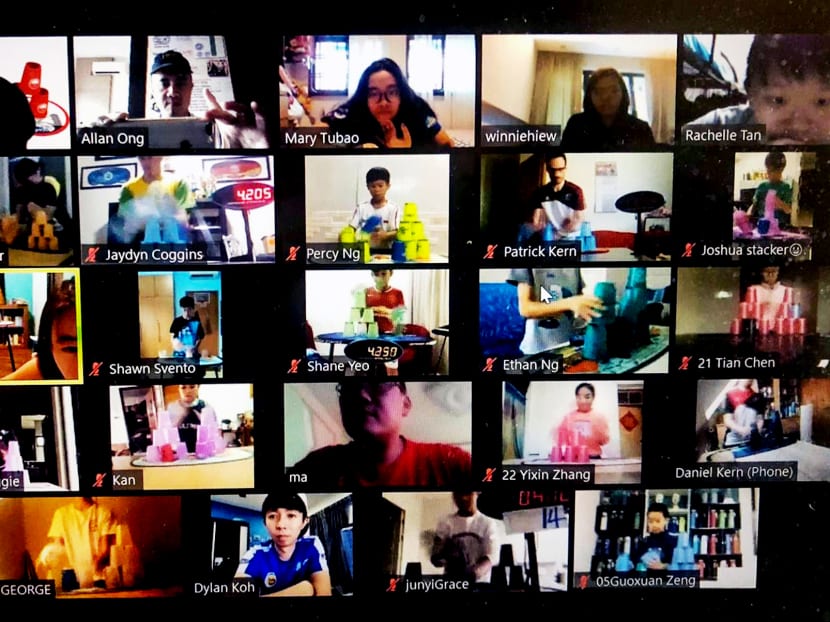
Mr Allan Ong, who heads the Singapore Sport Stacking Association, organised a sport stacking championship through video conferencing app Zoom.
SINGAPORE — No more jostling with the rush-hour crowd in the Central Business District to make it to the office on time for morning team meetings.
There is even time now in between conference calls to do the laundry or whip up something in the kitchen. One can even attend virtual meetings in pyjamas.
Since Tuesday (April 7), even more employees in Singapore have been working within the confines of their homes, along with the pros and cons that come with such an arrangement.
While some firms have implemented telecommuting earlier amid the Covid-19 outbreak, non-essential businesses and services came to a halt on Tuesday after circuit-breaker measures kicked in to stem a rising tide of infections, which reached the 1,000-mark on April 1.
TODAY’s interviews with Singaporeans found that working from home has its own set of challenges such as technical problems, unreliable internet connections or unconducive environments.
For some, their biggest challenge comes in the form of a screaming toddler or a needy elderly parent.
For Ms Josephine Tan, a 53-year-old public servant, having to juggle her official duties and family demands can drive her crazy at times.
The mother of three, aged 27, 23 and 16, said on top of having two children working from home and one on home-based learning, she also has to keep an eye on her 87-year-old mother who has dementia.
For Ms Chris Tan, a writer and editor for an engineering consultancy, working from home means having to take a conference call at times with an infant in tow.
Yet while frustrations are aplenty, there have also been many tender moments with their loved ones which would have not have been possible if not for the enforced stay at home.
Ms Bianca Loo, 35 , was grateful to have witnessed her nine-month-old son picking up a sippy cup for the first time, for example.
While not spending time in her office, her work at technology company Criteo involved lots of jet setting prior to the outbreak. Now, she gets to spend lots of quality time at home with her son.
A 27-year-old public servant, who wished to be known only as Ms Hanis, was thrust into the role of primary caregiver for her 83-year-old grandmother.
For the past week, they have been taking walks in the corridor of her flat, doing flower arrangements together and watching newly-added Bollywood films on Netflix.
Working from home has also allowed her to know her grandmother better, she told TODAY.
But while some have the luxury of working from home amid concerns of a community spread of the virus, frontline workers such as paramedic Hidayah Jamari do not have such an option. Ms Hidayah, 38, will still have to operate from her workplace daily.
For this group, there is a different set of challenges including having to work out alternative care arrangements for their children or elderly parents at home.
Nevertheless, as people here prepare to stay home till May 4, many have started to come up with creative ways to deal with their various challenges and make the best of this circuit-breaker period.
They range from teaching children how to garden and plan fashion shows, to virtual clubbing and organising a global sporting event online — all within the confines of their homes.
JUGGLING CHILDCARE AND WORK
Keeping children occupied is not an easy task, and parents told TODAY that they are doing their best to engage the kids now that everyone has to spend more time at home.
Some said that they have planned puppet shows, obstacle courses and even make-believe adventure quests to keep boredom at bay for the young ones.
Ms Violet Chan, 43, a partner of boutique agency The Style Atelier, said that she has come up with a whole month’s calendar of activities with her eight-year-old twins.
“Some of them include indoor picnics where we would lay out a picnic mat in our room and maybe have some nuggets or something.”
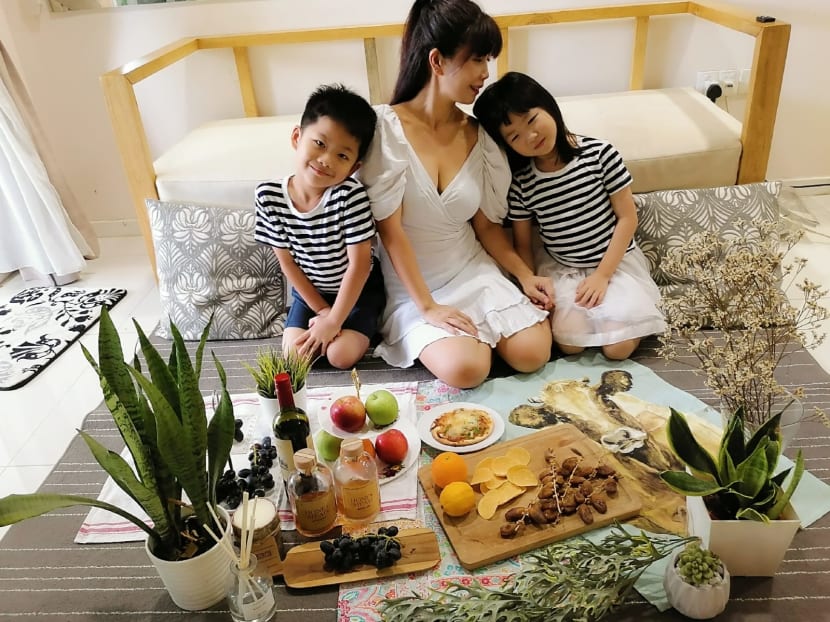
“We also plan to have a fashion show where I will give them some clothes and they can dress themselves up… They can also do their hair and make-up. It will be very fun to see them walk down an imaginary catwalk,” she said.
Polytechnic lecturer Lucas Chiam, 37, created obstacle courses using cones for his sons, four and six, to navigate using a toy car.
“It is a constant effort to keep them occupied but I find that if I give them directions or challenges in their activities, it helps them concentrate longer,” he said.
Mr Chiam also plays pretend with his children, where they will set up a make-believe cafe or go on adventure quests in the living room.
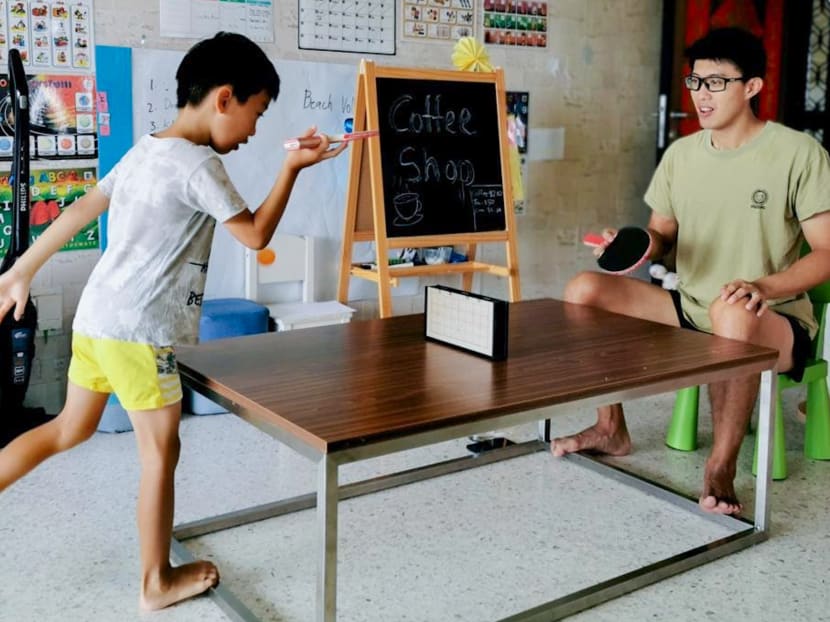
“Sometimes they will write down a list of cafe items on a menu and they will pretend that one of them is a chef and the other is a waiter to serve my wife and I.
“Or they will pretend that the floor is lava and have to move around without touching the floor,” he said.
Ms Noretta Jacob, who teaches a literacy programme for children aged five to seven, has planned puppet shows, musical performances and storytelling sessions with her two daughters.
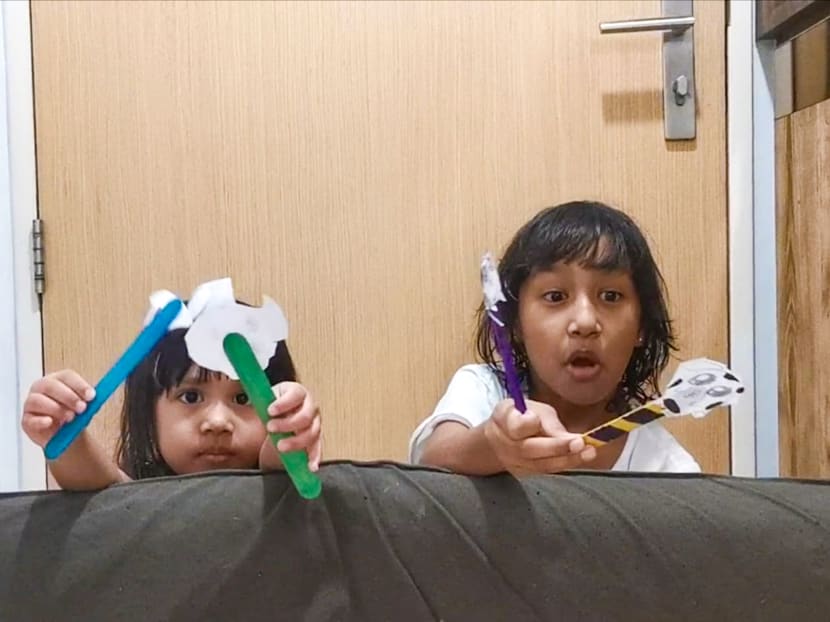
Since the circuit-breaker took effect, her husband — who is an essential services worker as a private-hire driver — has to work daily, leaving her to tend to her children, aged three and seven, who are on home-based learning.
“I see the beauty of sitting at home with my kids, but kids are kids, their attention spans are so limited... they have been pushing me out of my comfort zone as an educator to come up with more creative activities,” she said.
When she is conducting her programme that has now gone fully digital, she makes sure her children are occupied with activities such as painting or colouring.
But the usual cry for attention can still sometimes be heard, Ms Jacob added.
Still, it has been a rewarding experience for the family as they adjust to staying at home most of the time.
In fact, when they need a breath of fresh air, the family would lay their mat outside to have breakfast and enjoy the sun — in the corridor of their Housing and Development Board flat.
Ms Chris Tan, the editor, also faces the same struggle of trying to keep her two young children occupied.
As her husband works in the essential banking sector, working from home could mean having to take a conference call with a six-month-old strapped on her in a baby carrier and a toddler screaming for all to hear.
“Sometimes during the call, everyone could hear my four-year-old screaming for me in the background...so I forgo the conference calls and just tell (my co-workers) to update me afterwards,” she said.
Nevertheless, she is thankful that schools are now closed as she is concerned about the safety of her children, and they can have more time together.
She has bought her older daughter a micro-gardening kit for her to learn about growing pea shoots.
“She tends to it every day so that frees up some of my time to actually work...because seriously working from home isn’t easy, especially with kids,” she said.

Asked if her work has been affected by the need to look after her children, she pointed out that employers and co-workers need to adjust to mothers working from home, and set reasonable expectations.
Similarly, Ms Nur Anis, 27, whose husband is a frontline medical staff, said working from home can sometimes put her in a difficult position.
“I face the risk of being a bad employee because it is not possible for me to face my laptop from 8am to 6pm with my child at home, and I’d rather feel guilty about neglecting work than my child,” said the administrative and facilities management worker.
Ms Anis said she has no choice but to seek help from her ageing parents — who lives together with the family — to keep an eye on her 11-month-old baby boy, even though they are also taking care of her autistic nephew who stays over in their place on most days.
“Sometimes I feel guilty and helpless especially when my bosses are rushing me to finish a task and I can’t spare a minute to help my parents… because they (bosses) will keep calling my phone,” she added.
Despite such problems, some parents such as Ms Loo say the silver lining to working from home is to be able to witness their children’s milestones.
Ms Loo heads Criteo’s sales team for big customers in South-east Asia, Hong Kong and Taiwan.
“If this was any given day where we were not working from home, I would be travelling once every month to some South-east Asian countries and missing some important milestones (of her child’s development),” she added. “Or if I were working in the office, I would feel the fomo (fear of missing out).”
Ms Loo said she recently witnessed her nine-month-old son pick up a sippy cup, clap his hands or dance to a song for the first time.
“I am likely to witness his first steps and so that’s kind of exciting,” she added.
With the closure of swimming pools during this period, Ms Loo has also bought a baby pool for her son to splash in.

TENDING TO THE ELDERLY AT HOME
While children are already a handful for parents working from home, an equally — if not more — daunting task awaits those who suddenly find themselves having to double up as a caregiver to elderly parents.
Two public servants told TODAY that it can be particularly stressful when they are dealing with more work amid the Covid-19 pandemic.
One of them, Ms Hanis, said she has become the caregiver to her 83-year-old grandmother.
Her grandmother’s helper had returned to Indonesia late last month.
While waiting for a replacement helper, Ms Hanis’ aunt, who lives nearby, used to send her grandmother to stroke rehabilitation sessions while she and both her parents — who are in essential services — are at work.
But with non-essential activities halted and contact with other households discouraged, Ms Hanis has taken over the caregiver’s role since her aunt has to stay at home now.
“Managing the mountain of work I have plus looking after an elderly is definitely more difficult than I thought.
“There was once I had to take a call from my boss and my grandma was fussing over her lunch. A minute later, she kept poking me because she wanted to go to the toilet… I ended up talking to my boss while propping her up on the toilet bowl,” Ms Hanis said with a chuckle.
But the past week has also allowed Ms Hanis to know her grandmother better: They have been taking walks in the corridor of her flat, doing flower arrangements together and watching newly-added Bollywood films on Netflix.
“I never knew my grandma’s favourite actor is Shah Rukh Khan!” she said, referring to the renowned Bollywood actor.
For Ms Josephine Tan, the public servant whose elderly mother has dementia, the past week has also been bittersweet.
She has given her helper more time to rest as her family members are now at home and can take turns looking after her mother, whom she described as “very energetic”.
In fact, the elderly woman has been walking around the house more often now, looking over her children’s shoulders to see what they are doing on their laptops.
“My youngest son has been teaching his grandma how to watch Netflix on his tablet,” Ms Tan said with a laugh.
However, she added that working from home can sometimes “drive her crazy”.
“Everyone will be sitting around the dining table and it can get very chaotic. My eldest daughter will be calling her boss and my mum will be screaming for my helper.
“At the same time, my son is trying to finish his homework and I’m trying to clear my pending tasks,” she said.
But the madness aside, Ms Tan is happy that the “circuit-breaker” has brought the family together as they have more time to prepare and eat dinner, play board games and organise movie nights after everyone has logged off.
“Since all of us are staying at home all week… I think my mum is enjoying the circuit-breaker period the most,” said Ms Tan.
Retiree Ms Jasmine Chua, who has been caring for her 84-year-old mother with muscular dementia for the past three years, noted that it can be very challenging for first-time caregivers.
“Caregiving is something that you may have a lot of questions that you don’t have the answers to,” said the 47-year-old, who had stopped sending her mother to the NTUC Health daycare centre for dementia therapy as she was afraid of a community spread.
For example, when her father died in 2017, her mother refused to eat or drink and kept searching around the house for him.
Ms Chua did not know how to help her mother then, and it took years of research and trial-and-error for her to understand how to support someone with dementia.
She added that in the current situation, it could be harder for caregivers to seek support.
“The general practitioners can’t help you, and to get the help of specialist doctors or counsellors now is very difficult because everyone is busy trying to settle in to the new arrangements,” Ms Chua said.
THOSE IN ESSENTIAL SERVICES
While those who work from home now have the luxury of spending more time with their families, some workers in essential services — which remain in operation during this period and include food establishments, healthcare and social services — are seeking alternative arrangements to care for their loved ones.
Paramedic Hidayah, whose husband works in the telecommunications sector, initially planned to send her three-year-old daughter to her mother’s house, which is a 15-minute walk away.
But after Health Minister Gan Kim Yong announced on Thursday (April 9) that parents will no longer be allowed to drop off children at their grandparents’ home on a daily basis as part of care arrangements, Ms Hidayah said she might consider taking leave to tend to her daughter at home and let her return to preschool when the “numbers have stabilised”.
Since she and her husband are both essential services workers, Ms Hidayah could have sent her child to a preschool. Such schools remain open for children of parents who are employed in essential services or unable to find alternative caregiving arrangements.
But she decided not to as her toddler falls sick quite easily.
“Maybe I’m just being a kiasu parent but with all the cases I see every day, I just don’t want my child to be infected. I feel more at ease knowing that they are with my parents as they rarely go out of the house,” she added.
Ms Hidayah has also prepared arts and crafts materials and interactive games for her daughter to play, as well as allowing her two hours of screen time a day during this period.
Unlike Ms Hidayah, single mother Siti Khasy, 21, continues to send her six-year-old daughter to preschool while she does her rounds as a GrabFood delivery rider.
“This (arrangement) is good because she can continue to go to school while I go to work,” she said, adding that she is the sole breadwinner for the pair.
Asked if she is concerned that her child might come into contact with an infected person, Ms Siti said she was not as there are not many students at the centre during this period.
Another parent who provides an essential service is 41-year-old Shi Mei, who runs a hawker stall with her husband in Bedok South.
While the couple are at their stall for about eight hours daily, their children, an 11-year-old girl and a 13-year-old boy, are left to their own devices at home as they do home-based learning.
"Previously, they used to study in front of our hawker stall after school where we can watch after them, but now they must be at home so we can’t supervise them as much,” Ms Shi said.
Nevertheless, she drops by their flat occasionally to pass lunch to her children or to check on how they are doing.
Although the circuit-breaker measures have made it harder for her to observe her children’s progress, she trusts them to be independent.
“Our children are already old enough… we can count on them to be proactive,” she added.
KEEPING ACTIVE, HAVING FUN, GOING GLOBAL — ALL FROM HOME
The Government has repeatedly stressed that the only way to reduce the number of Covid-19 infections is for Singaporeans to stay at home.
On Monday (April 6), Prime Minister Lee Hsien Loong said in a Facebook post that the multi-billion dollar initiatives unveiled in the three Budgets since February to help firms, workers and households will be “in vain” if Singaporeans do not comply with the circuit-breaker measures.
“Everyone needs to be serious about staying at home, and not go about unless absolutely necessary. If you have to go out, practise safe distancing,” Mr Lee stressed.
With more people staying home now, the Government has said it will enhance digital fitness and entertainment services.
More television and streaming content will also be made available here, the Infocomm Media Development Authority (IMDA) announced earlier this week.
IMDA said that it will be working with local broadcaster Mediacorp, pay-TV operators Singtel and StarHub, and other content providers to make more news, educational and entertainment content available across free-to-air and over-the-top platforms.
The IMDA initiatives could benefit Singaporeans like Mr Derrick Yeo, 35, who have gone on a quest to come up with interesting activities to fill their time.
Mr Yeo has replaced his weekly visits to nightclub Zouk Singapore with its free livestream service called “Cloud Clubbing”.
Mr Yeo, who owns a firm selling sewing machines, would join the livestream on mobile application Bigo Live with his friends and family over drinks at his home.
But with the latest social-distancing measures, where social gatherings of any size are not allowed in homes or public places, his friends would no longer be able to come over and join him.
During the livestreams, viewers can watch dancers perform to the tracks played by a disc jockey.
“I tried (cloud clubbing) because this is my first time hearing about it and I wanted to try it out of curiosity. Anyway, it is not safe or responsible to go out into a big crowd now,” Mr Yeo said.
He has donated S$2,000 to Zouk and spent S$5,400 on coupons which can be used to buy bottles of alcohol when the club reopens.
Asked which he likes better— clubbing in the virtual or real world — Mr Yeo said he does not have a preference.
“I like both, if I am too lazy to go out, I can enjoy the music at home, but going to the club allows me to enjoy the vibes better,” he added.
Meanwhile, to help Singaporeans keep fit even as they stay home, Sport Singapore has called on the sport industry to create innovative home-based programmes in April and May as part of its annual GetActive! Singapore campaign.
Industry players can submit proposals for online infotainment videos, physical exercise and movement series, talk shows and workshops under the Active Enabler Programme, which has a grant budget of S$2 million. Its first call for proposals was launched on Thursday for digital content and virtual activities.
Apart from these programmes, some Singaporeans are using video conferencing app Zoom — which is being used by many organisations for virtual meetings, although security concerns have emerged of late — to exercise or take part in physical activities at home.
Ms Sue Seah, who is in her 30s and self-employed, said she had attended two online classes for Street Jazz and Urban Hip Hop with dance academy O School.
Viewers would follow the dance instructor’s steps through a mass video call of up to 100 people. Both classes which Ms Seah attended were almost full.
“I think that in real life, the energy is really different… but the instructors have put in so much effort to make it interactive and fun so it is definitely better than having nothing,” she said.
Ms Chloe Ng, 40, a senior financial services manager, started to host complimentary online yoga and High Intensity Interval Training classes this week for her friends and other mutual acquaintances. Each lesson has about 10 students.
“I wanted to start this because it is one way to keep in touch and for community support,” she said.
“It allows us to exercise together too, which is fun and keeps us accountable to a friend so that we will be motivated to continue exercising.”
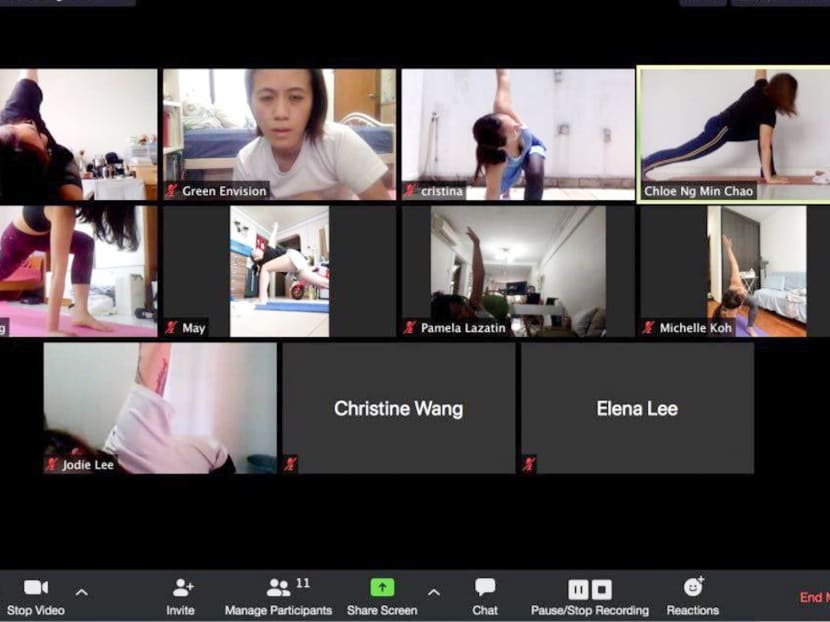
She added that the classes are interactive and students can pose questions. But they had experienced a few technical difficulties during previous classes.
“If I am doing a class physically, I can just walk over and correct their postures immediately which is easier,” she said.
Some Singaporeans are also using this period at home to devote more time to their hobbies.
One of them is undergraduate Remus Ng, 22, who has been buying and restoring broken gaming consoles for about a year.
Mr Ng said he would buy the broken gaming consoles such as Playstation 1 and 2 through online marketplaces such as Carousell. He would then diagnose the technical issues and source for replacement parts on sites such as Ebay and Amazon.
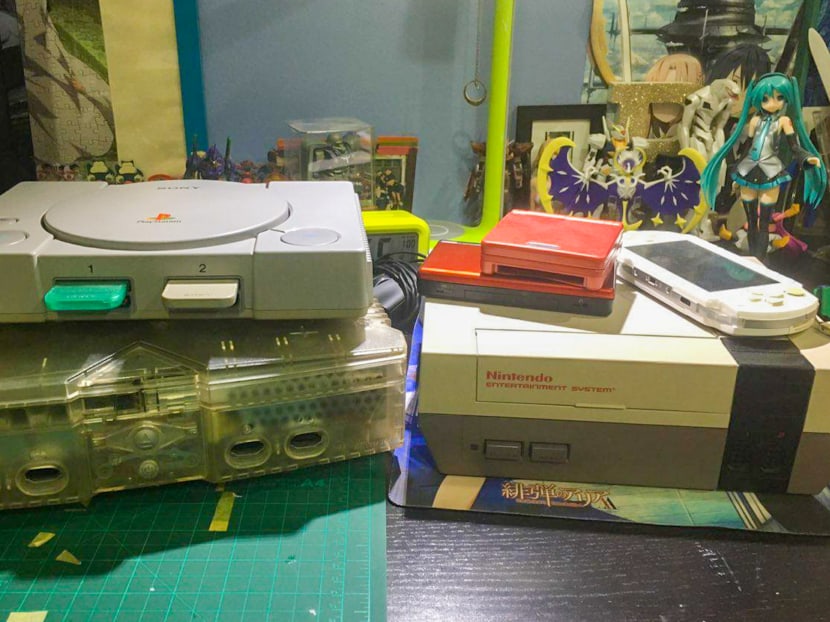
“For older consoles, it is more romantic to play with the original console rather than trying to run the software on a computer,” he said.
For Mr Allan Ong, 45, who heads the Singapore Sport Stacking Association, the pandemic has not stopped him from organising a global event.
Sport stacking — also known as cup stacking or speed stacking — requires participants to stack and unstack cups in various formations as quickly as possible.
The stage was supposed to be set for a three-day world championship event at Downtown East this weekend, with the association expecting to receive 600 participants — including spectators — from various countries.
“But we knew this (Covid-19 situation) was coming so we have already prepared to go fully digital,” he said.
Last Sunday, the association organised a preliminary competition online by separating participants into different “rooms” on Zoom where one judge will be present.
Some 50 competitors have signed up for this weekend’s championship.
Each of them will have their own timer which they would press before they start stacking and after they finish.
Mr Ong said his biggest challenge is to convince spectators and competitors that they will have a good time virtually.
“I think it’s like online shopping. Before people try it, they all say they prefer to go to the physical store and try the clothes on. But when everyone is doing it, then it feels more fun,” he said.






